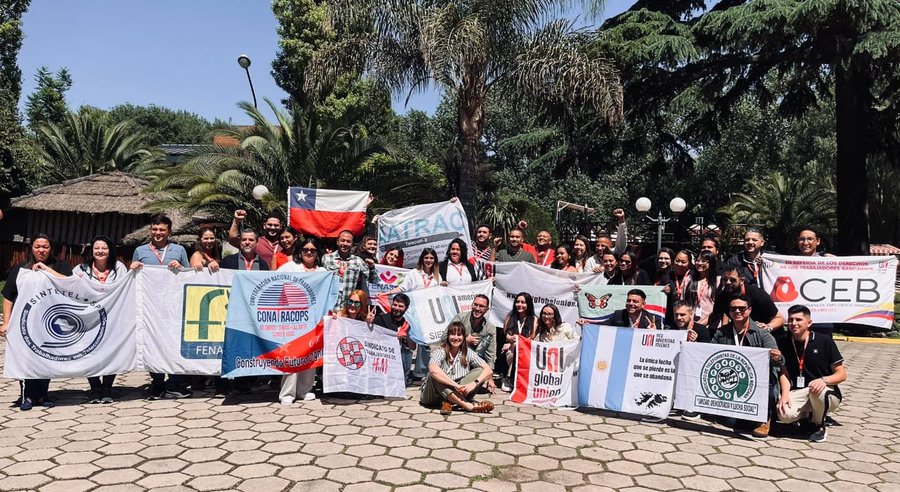UNI Americas Youth Conference Calls for Solidarity, Inclusion, and Action
05.12.24
With the participation of 80 young union leaders from 12 countries and 25 organizations, the UNI Américas Youth Conference concluded with a resounding call for solidarity, inclusion, and action in addressing critical issues like technological change, environmental protection, and diversity in the labour market.
The conference, marked by vibrant debates and strategic discussions, showcased the energy and commitment of young unionists to shape the future of work in a region grappling with inequality and precarious employment.
In addressing the importance of youth participation in union activities and strategic planning, Marcio Monzane, Regional Secretary of UNI Americas, emphasized the need for inclusive and collaborative spaces within unions, particularly focusing on the perspectives of younger generations. He stated: “The trade union organization forum serves as a laboratory to understand and rebuild our strategy each time we hold it, with the participation of young people. This conference focuses on an implementation plan, and it is not possible to carry it out without including the perspective of young people. We have sectors, such as call centers, where over 70% of the workforce are young people, for example. I encourage you to engage in meaningful debates to incorporate your perspective into our strategy.”
David Pintos UNI Youth Coordinator for the Americas highlighted the pressing challenges posed by technological advancements, stating: “Young people often enter jobs requiring technological skills, facing a widening gap between highly skilled workers and those with less training. Constant learning is essential to navigate these new modalities.”
Christy Hoffman, UNI Global Union General Secretary pointed out to the challenges faced by young workers and the need to organize into unions: “I have full confidence in the power of young workers to serve as union leaders. In my youth, it was more common for young workers to get permanent full time jobs, but today precarious work is a key challenge. And some employers, like Amazon or call centers, intentionally plan for high workers turnover. This should not discourage you. The key to securing a better future lies in organizing the unorganized in order to build a resistance to unfair practices and be prepared to negotiate a better future.”
UNI Américas President Héctor Daer echoed these concerns, urging attendees to leverage intergenerational dialogue: “Technology must improve workers’ quality of life, not amplify regional inequalities. You, as young leaders, have the unique ability to frame this debate.”
The panel on new technologies emphasized the urgent need for strategies to mitigate automation’s effects, with suggestions like universal income and work-hour reductions gaining traction.
The conference celebrated the rich diversity of its participants, focusing on breaking down barriers for marginalized groups. Marta Ochoa, Global Head of UNI Youth, stressed: “Diversity is not just tolerance but respect for differences. As younger generations reject binary gender norms, we must ensure equal opportunities for all, regardless of sexual identity, race, ethnicity, or migration status.”
Success stories, like Argentina’s trans employment quota, underscored the transformative power of inclusive policies, even as challenges from reactionary forces persist. Climate change took center stage as young unionists called for a just transition toward sustainable economic models. Erick Baldo from Brazil urged action: “To achieve climate justice, we must hold Global North countries accountable for their emissions while ensuring quality job creation for youth.”
A motion advocating for young workers’ active role in climate action was unanimously approved, reinforcing the region’s commitment to environmental advocacy.
Outgoing UNI Americas Youth President Lucimara Malaquías reflected on her tenure, urging the new committee to defend democratic values and youth inclusion in union decision-making:“You now become international leaders. Defend justice, inclusion, and democracy. Empower yourselves to drive change.” Her successor, Juan Manuel Silva of Argentina, emphasized the urgency of integrating young voices into union structures: “The precarious nature of youth employment makes it hard to plan for the future. If unions fail to include young workers, they risk becoming obsolete.”
The conference concluded with a unanimous approval of all motions, now formal UNI resolutions, and the election of a new Youth Committee with a 40% gender quota. Participants left with renewed determination to tackle inequality, fight for workers’ rights, and build a sustainable and inclusive future.
As UNI Youth leaders emphasized throughout the event, the future of labour in the Americas depends on the strength, creativity, and unity of its young workers. #SolidaridadEnAcción.
News
Uncategorized
UNI Americas


